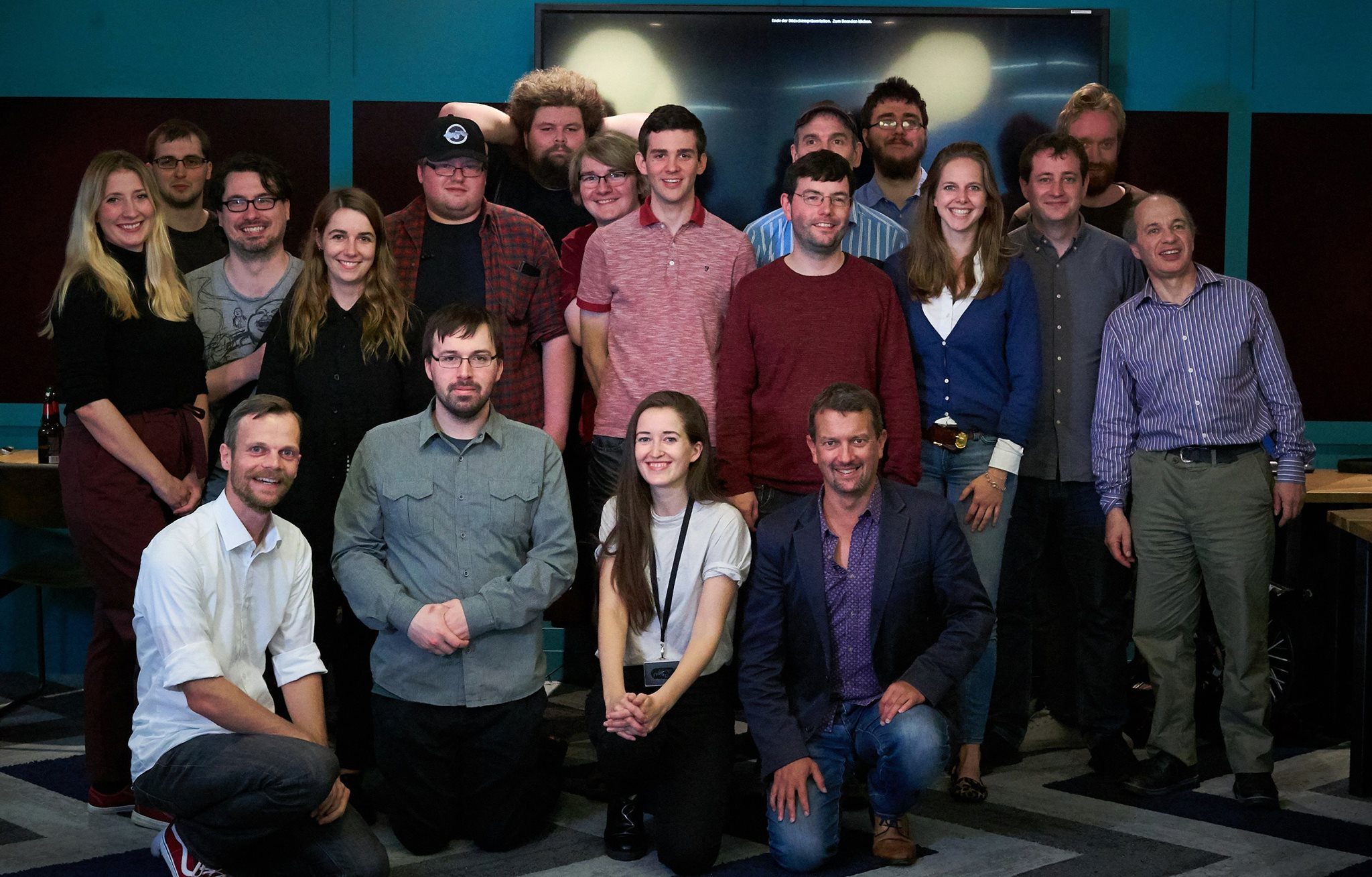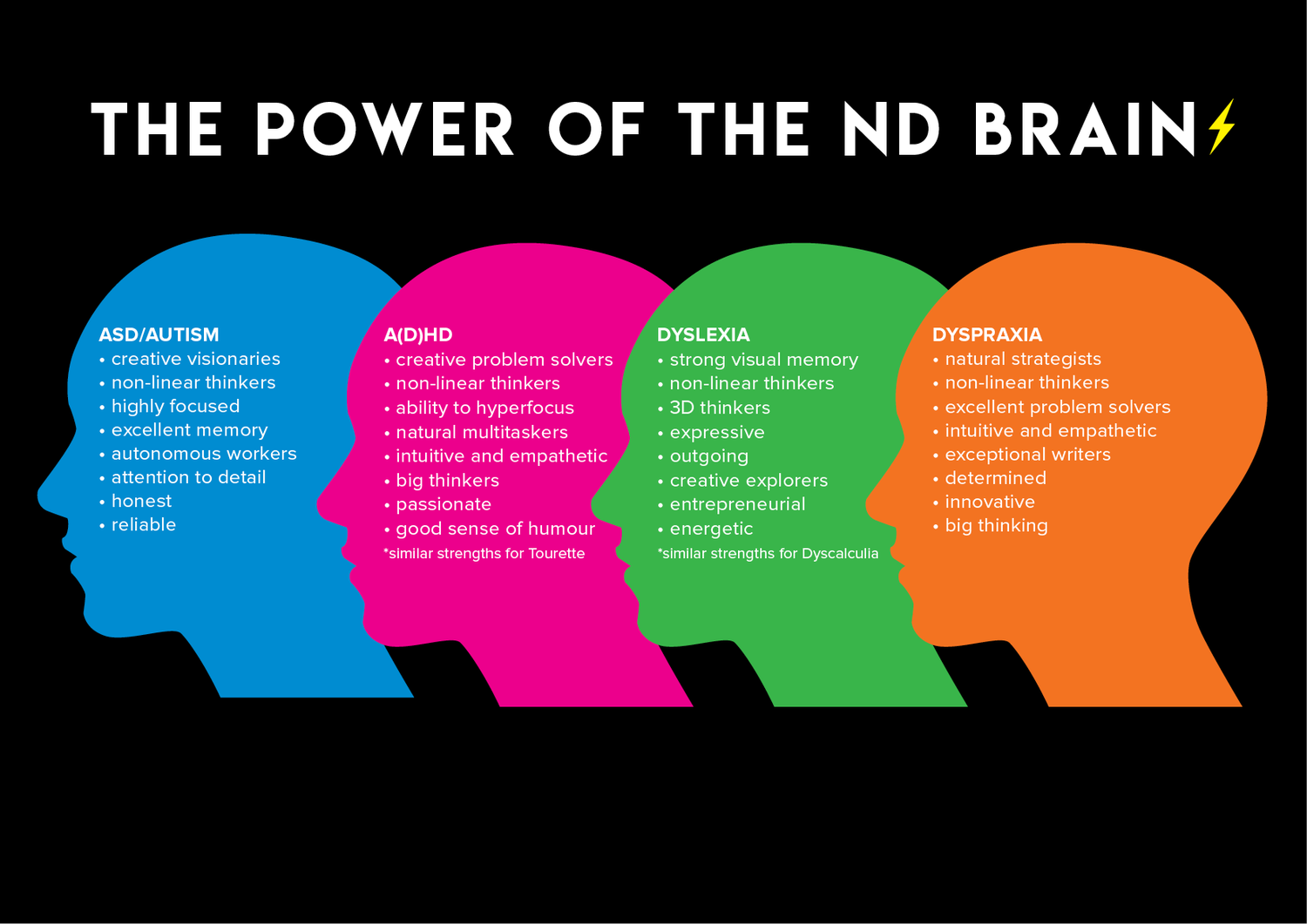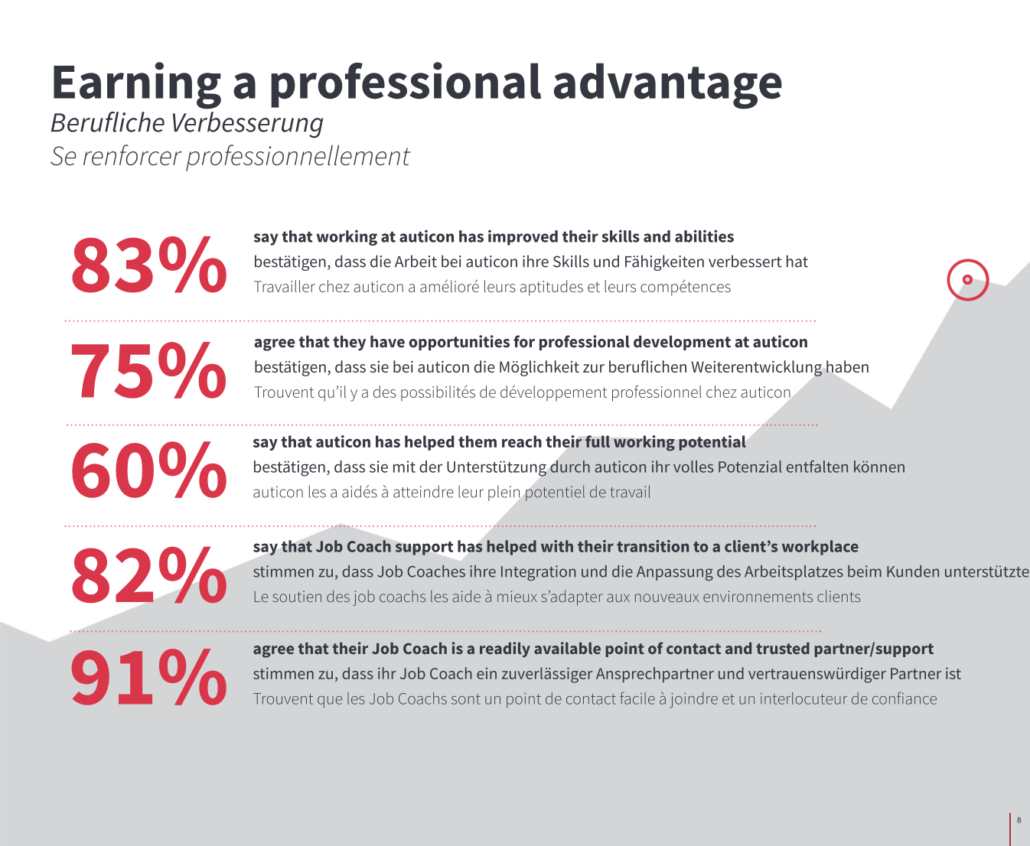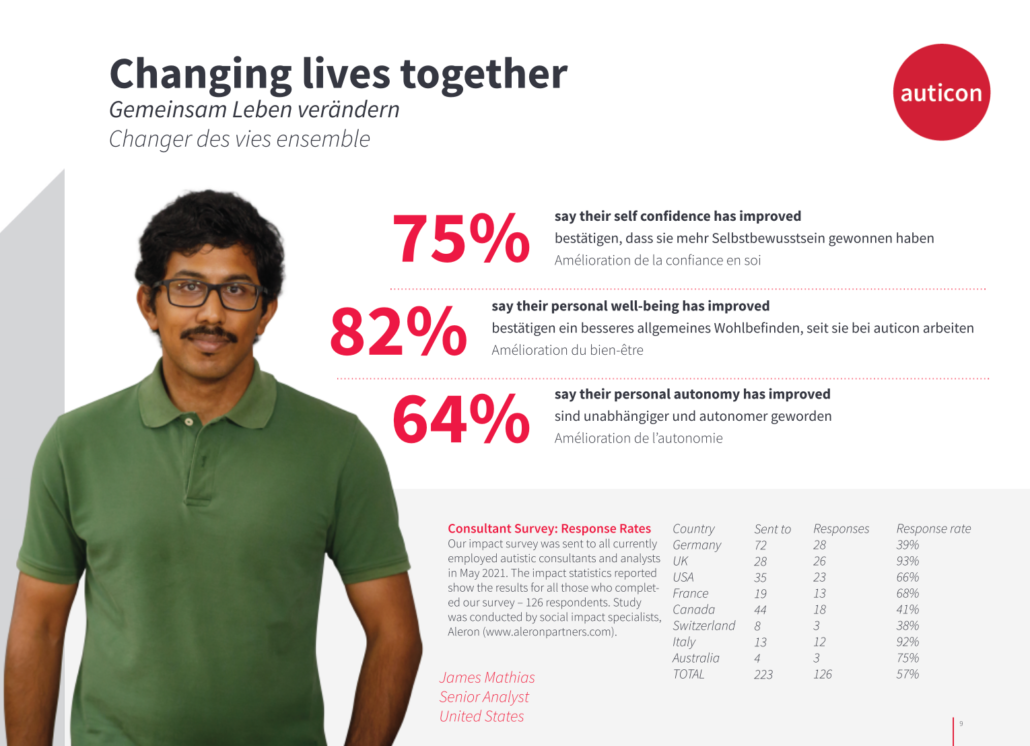 797
797  6 mins
6 mins Some autistic adults have extraordinary talents in STEM and unique cognitive advantages in logic, pattern recognition, precision, sustained concentration, and an ability to intuitively spot errors, yet many find it difficult to secure or maintain mainstream employment.
auticon is a pioneering social enterprise that is building a team with adults on the autism spectrum who are fully trained technology consultants specialising in data science, cybersecurity, software development, and quality assurance.
auticon is “unofficially one of the biggest employers of people diagnosed with autism in the world,” tells us Steve Hill, Commercial Director at the firm.
A multinational IT consultancy and social enterprise, auticon is also the first consultancy business in the world to exclusively employ adults on the autism spectrum as consultants.
Founded in Germany in 2011, they work with around 260 consultants in 9 countries. Their activity keeps growing, and they are constantly recruiting new consultants, addressing the worldwide skills shortage in the STEM sector.
On a surface level, they provide a high-demand service to a growing industry.
But the core of their work is creating accessibility to appropriate employment for skilled autistic adults. And the collaborative consultancy approach is creating opportunity and spreading education about neurodiversity to other organizations.
A recent report by the Office of National Statistics in the UK showed that autistic people face the highest unemployment rate in that country. Only 22% of autistic people are in employment. However, 79% of autistic people out of work and receiving unemployment benefits want to work. And a further 43% of those who have worked report having left or lost a job because of their autism.
The numbers are shocking. So when we heard about the work that auticon was doing, we wanted to know more. Speaking with Steve Hill, Commercial Director at auticon, we saw how truly passionate he was to be part of a company making a much-needed impact.

Team at auticon – photo courtesy of auticon
Let’s start from the beginning. What is the origin story of auticon, and what is the context in which it was created?
Steve Hill: auticon is a social enterprise. That means that the cornerstone of auticon is our social mission. It falls into two parts, the first is giving and providing long term career opportunities for autistic people. The second part is really about autism and neurodiversity awareness and education in the workplace.
auticon was based on a personal lived experience with our founder, Dirk Müller-Remus. His son is autistic, and fundamentally, he set up the business to provide him with an opportunity to work. Like many people who have children or families with autism, he was very aware of the limited career opportunities for autistic people.
Why are the employment statistics of people with autism so shocking?
People with autism find it very difficult to go through the traditional employment process. For example, the way job descriptions are written. Someone with autism who sees that the role requires 5 years of experience might not apply if they have 4 years, 11 months and 29 days experience. And the process only gets potentially more challenging from that point onward – particularly with the job interview situation.
Our founder was very conscious of that and decided to create a culture of disclosure by employing autistic consultants.
What do you do differently when your clients engage your IT consultants?
We provide training intertwined with the consultancy. By working with clients and delivering inclusion training, we show them that supporting neurodivergent employees in the workplace isn’t a big scary thing. More than anything else, it’s about taking the clients on a journey.
You know the phrase, “if you do the same things time and time again, you are going to get the same result.” What you typically find in the workplace is that big organizations have tended to hire the “right fit.” But what they really want is innovation, different perspectives and different outcomes.
With a more diverse team, you can expect more diverse and better results.
Helping our clients tap into a talent pool that they wouldn’t necessarily have accessed also has clear commercial benefits. Our consultants help teams with all things concerning data analytics, cyber security and software engineering. In the first two categories, there is a worldwide skills shortage.
But neurodiversity in teams also has an astonishing effect on work culture. Communication becomes clearer and more efficient, team spirit gains new momentum and employees feel valued for their unique and individual selves.
So, awareness and education are essential.
Another unique thing about us is our team of job coaches. All the coaches have backgrounds in clinical psychology. They act as a bridge between the consultant and the client, and they help us turn an engagement into a case study.
In the lead up to an engagement, the coaches work with clients to understand the unwritten rules of the workplace. They also give the clients some specific awareness and education about autism and the context of that individual consultant.
There is a well-known saying:
“If you’ve met one autistic person… then you’ve met one autistic person.”
A lot of what we do is dispel myths around preconceived ideas around autistic people.
These awareness sessions and the coaching help get everyone on the same page. There are always some modest accomodations that need to be considered when working with our consultants. For example, we explain the importance of giving the consultant some prior warning and avoiding last-minute meetings, decisions or changes. Or something simple like adding an agenda on a meeting or a call. We recommend outlining what is required and expected, who is expected to speak about what subject, and spelling out if our consultant is expected to comment, challenge, question, and give feedback.
Subjects like these often tend to blur into the unwritten rules of the office environment.
We also help clients by looking at their job descriptions to make them more inclusive, attracting, retaining, and developing their own talent.
It’s an approach that creates a culture of acceptance where people can feel safe to disclose. It’s a stepping stone approach. We help our clients to eventually do all this themselves – this is the goal. But as you can see, it all really starts internally. And the surprising thing is that most organizations of any consequence have lots – potentially hundreds – of neurodiverse employees.
Tell me a little bit more about the role of the job coach?
The job coaches are there to provide a support package to the consultants and the clients. Think of them as mentors. They are not our consultants’ line managers. But they do know them really, really well, and not just from a work perspective. The job coaches are attuned to the sensitivities of each individual. It comes back to that idea “once you’ve met one autistic person, you’ve met one autistic person.”

The Power of the ND Brain – courtesy of auticon Ltd / Facebook
When most people think about the autism spectrum, they tend to think of a linear spectrum, where one person can be more autistic than someone else. That is not the case. It’s a myth. There are frequently co-current conditions with autism – ADHD, dyslexia, OCD, or any number of different things.
The actual best way to represent the spectrum is with a circle, with different cognitive skills in a ring around the circle. If you think of the center as 0 and the outside as 10, what you see for each person is a circle with a spiky profile.
When we hire consultants, we test them for their technical abilities. Most of them have formidable academic qualifications behind them. And on the cognitive side, that spiky profile allows the job coaches to match the consultant with the right engagement. The coaches look at the type of work, the environment, the company, the sector, the pace at which the team operates. They also look at things like the length of the project. Is it a long term project? Or is it much more agile in terms of product development? We also deal with many professional services organizations which can be quite intense, fast-paced environments.
The understanding of cognitive abilities is really crucial for finding the best fit. We want to make sure that we don’t place a consultant who isn’t a good fit and might have an adverse reaction to the different levels of pressure or speed or factors.
For all these reasons, the job coaching function is absolutely crucial.
What has been the impact so far?
We are not a charity, but we do positively impact society. Not only for the consultants but their immediate family members and their friends.
On the statistical side, the vast majority of unemployed autistic adults want to be employed and want to be valuable contributors, to follow their passions, just like everybody else.
We offer a pathway into the workplace.
Here are also some of the statistics that we have compiled in our 2021 Global Impact Report:


Our tagline is inspiring people, inspiring people. We consider you to be an inspiring person, but who inspires you?
On a daily basis, to be honest, it’s our consultants.
It is very humbling to understand some of the experiences that they’ve had in their personal and professional backgrounds.
The world can be a pretty intimidating place. I think that embodying a culture of acceptance will have consequential benefits to the efficiency and productivity of companies in the capitalist world that we live in.
But it is also about the fact that everyone wants 2 things: we want to be appreciated for the work that we do and accepted for the person we are. And when you keep that in mind, and you look at the consultants who are just the most phenomenal humans that you can come across, it’s very refreshing. There is no politics with our consultants – when you ask a question, you get a very direct answer with no hidden intent that you don’t often encounter in an office environment.
The honesty and authenticity are great.
More Information
Find more information on auticon on their website, or you can follow them on Facebook, Twitter or LinkedIn
Feature image: Consultants at auticon – image courtesy of auticon


 End FGC Singapore (EFS)
End FGC Singapore (EFS)  Give Your Best
Give Your Best